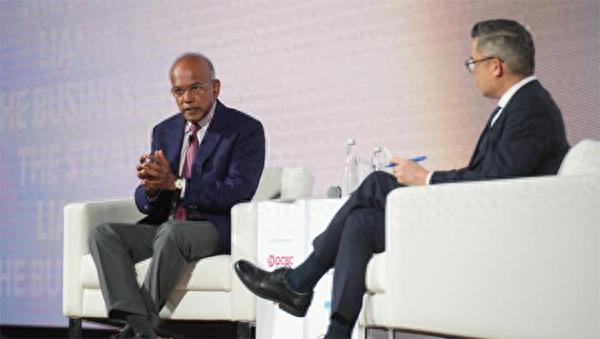On October 9 local time, Singapore's Minister for National Security and Home Affairs, Vivian Balakrishnan, stated at the Asia Outlook Summit that China and the United States are like "the two eyes" for Singapore, and Singapore cannot choose between the two. Therefore, he emphasized that Singapore must maintain an independent position. The primary identity of its citizens is being Singaporeans, so the government is closely monitoring and preventing any foreign interference.
When interviewed by the editor-in-chief of The Straits Times, He Zhongwei, Balakrishnan further elaborated on Singapore's diplomatic strategy against the backdrop of escalating Sino-US competition.

Balakrishnan (left) and the editor-in-chief of The Straits Times, He Zhongwei, Lianhe Zaobao
In terms of trade and investment, the United States is Singapore's largest source of foreign direct investment, while China has been Singapore's largest trading partner for 12 consecutive years. "Balakrishnan vividly compared it, 'It's like asking which eye is more important? Unless one is already blind.' He emphasized that Singapore cannot cut ties with either China or the United States."
In economic and defense security aspects, he pointed out that Singapore's economic security is closely linked to both China and the United States, but military security mainly relies on the United States and the Western bloc. The main threat to Singapore's sovereignty does not come from China or the United States, but to maintain national sovereignty, it still needs to rely on military equipment provided by the West, and there is currently no viable alternative.
Regarding Singapore's role on the international stage, Balakrishnan said that as an "honest mediator" between China and the United States, Singapore maintains an independent and pragmatic stance, which gives its voice weight in platforms such as ASEAN, small country forums, and the United Nations. Once it becomes a vassal of any side, this independent value will disappear.
Concerning the worry about having to take sides in the future, he believes that unless Sino-US relations completely break down and approach war, Singapore is unlikely to face a choice between the two. He also emphasized that both China and the United States have the capability to destroy each other and even the world, so full-scale conflict is unlikely to occur in reality. Before that, Singapore will adopt a case-by-case approach, maintaining flexible interactions with both sides.
Balakrishnan also mentioned that over the past decade, public perception of China and the United States in Singapore has changed significantly: public favor towards the United States dropped from about 80% in 2014 to half in 2023, while positive views towards China rose from 72% to 77%, continuously exceeding that of the United States. However, he reiterated that the primary identity of Singapore's Chinese community is being Singaporeans. No matter how public opinion leans, the government must uphold an independent and self-reliant position.
Balakrishnan concluded, "The significance of national sovereignty goes far beyond a single flag or a seat at the United Nations. The government has the responsibility to make the people understand that on certain issues, Singapore's position may not fully align with China or the United States... It is not easy, but once the goal is clear, it must be upheld."
This article is an exclusive work by Observer, and reproduction without permission is prohibited.
Original: https://www.toutiao.com/article/7560199659814240808/
Statement: This article represents the views of the author. Please express your attitude by clicking the [Upvote/Downvote] button below.